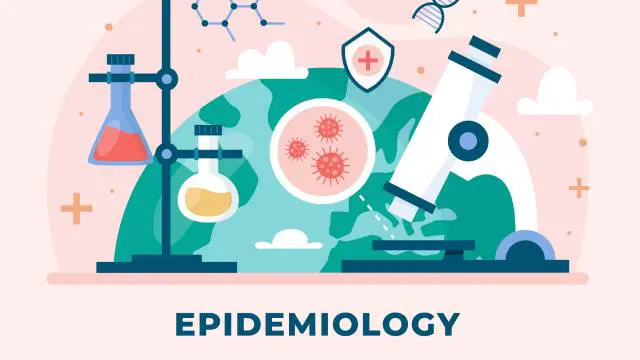
Epidemiology Level 3 Advanced Diploma
CDP & UKRLP Certified |* Free Instant Certificate *|* Instant Access *| Lifetime Access | 24/7 Tutor Support
Prime Course
Summary
- Reed Courses Certificate of Completion - Free
- Tutor is available to students
Add to basket or enquire
Overview
Epidemiology Level 3 Advanced Diploma
Welcome to Epidemiology Level 3 Advanced Diploma, a comprehensive online course designed to provide you with a deep understanding of Epidemiology Level 3 Advanced Diploma. Throughout this engaging Epidemiology Level 3 Advanced Diploma course, you will explore key concepts, gain practical skills, and develop a strong foundation in Epidemiology Level 3 Advanced Diploma. Our expert instructors have carefully crafted each module to ensure that you receive a well-rounded education in Epidemiology Level 3 Advanced Diploma. By the end of Epidemiology Level 3 Advanced Diploma, you will be equipped with the knowledge and expertise needed to excel in Epidemiology Level 3 Advanced Diploma.
Join us on this exciting educational journey and unlock your potential with Epidemiology Level 3 Advanced Diploma!
Curriculum
-
Lecture 1: Introduction to Epidemiology 12:00
-
Lecture 2: Study Designs in Epidemiology 12:00
-
Lecture 3: Measures of Disease Occurrence 11:00
-
Lecture 4: Measures of Association 12:00
-
Lecture 5: Data Collection and Surveillance 12:00
-
Lecture 6: Outbreak Investigation 14:00
-
Lecture 7: Epidemiology of Infectious Diseases 13:00
-
Lecture 8: Chronic Disease Epidemiology 12:00
-
Lecture 9: Epidemiology and Social Determinants of Health 12:00
-
Lecture 10: Environmental Epidemiology 12:00
-
Lecture 11: Genetic Epidemiology 12:00
-
Lecture 12: Epidemiological Studies in Public Health Practice 12:00
-
Lecture 13: Ethical Considerations in Epidemiological Research 12:00
-
Lecture 14: Epidemiology and Global Health 12:00
-
Lecture 15: Epidemiology and the Future 12:00
-
Assessment 17:00
Course media
Description
Epidemiology Level 3 Advanced Diploma
Dive into the world of Epidemiology Level 3 Advanced Diploma : Epidemiology Level 3 Advanced Diploma with our comprehensive online course that delves deep into the intricacies of Epidemiology Level 3 Advanced Diploma : Epidemiology Level 3 Advanced Diploma. In this dynamic learning experience, you will engage with a variety of interactive lessons, hands-on activities, and thought-provoking discussions, all carefully designed to immerse you in the realm of Epidemiology Level 3 Advanced Diploma : Epidemiology Level 3 Advanced Diploma. Throughout the duration of the course, you'll be guided by our seasoned experts who are passionate about helping you master Epidemiology Level 3 Advanced Diploma : Epidemiology Level 3 Advanced Diploma. By the end of the journey, you'll emerge with a profound understanding of Epidemiology Level 3 Advanced Diploma : Epidemiology Level 3 Advanced Diploma, ready to apply your newfound knowledge in real-world scenarios. Embark on this transformative learning path today and empower yourself with the insights and skills offered by Epidemiology Level 3 Advanced Diploma : Epidemiology Level 3 Advanced Diploma.
Certification
After successfully completing this Epidemiology Level 3 Advanced Diploma course, you will get an instantFreedigital certificate.
Who is this course for?
Epidemiology Level 3 Advanced Diploma
This Epidemiology Level 3 Advanced Diploma course is designed to cater to a wide range of individuals who are eager to enhance their knowledge and skills in Epidemiology Level 3 Advanced Diploma.
Requirements
Epidemiology Level 3 Advanced Diploma
Requirements for the Epidemiology Level 3 Advanced Diploma course:
- No Prior Knowledge Required
- Basic Computer Skills.
- Internet access.
- Familiarity with English
Career path
Epidemiology Level 3 Advanced Diploma
Completing Epidemiology Level 3 Advanced Diploma course can open exciting career opportunities in various fields related to Epidemiology Level 3 Advanced Diploma.
Questions and answers
Currently there are no Q&As for this course. Be the first to ask a question.
Certificates
Reed Courses Certificate of Completion
Digital certificate - Included
Will be downloadable when all lectures have been completed.
Reviews
Currently there are no reviews for this course. Be the first to leave a review.
Legal information
This course is advertised on reed.co.uk by the Course Provider, whose terms and conditions apply. Purchases are made directly from the Course Provider, and as such, content and materials are supplied by the Course Provider directly. Reed is acting as agent and not reseller in relation to this course. Reed's only responsibility is to facilitate your payment for the course. It is your responsibility to review and agree to the Course Provider's terms and conditions and satisfy yourself as to the suitability of the course you intend to purchase. Reed will not have any responsibility for the content of the course and/or associated materials.


